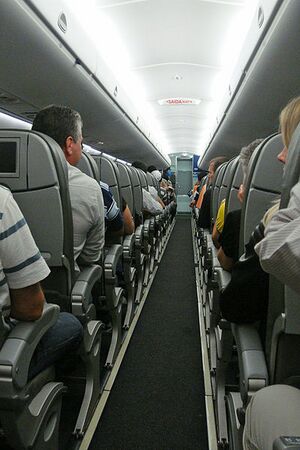Economy class syndrome
Thromboembolic events associated with long travel are referred to as economy class syndrome. It occurs mainly in passengers in economy class of an aircraft[1]. Economy class syndrome mainly involves deep vein thrombosis of the lower limbs, which can lead to pulmonary embolism and, in extreme cases, sudden death.
Epidemiology[edit | edit source]
The risk of thromboembolic disease increases in travellers on average about 3 times compared to other populations[2]. When travelling by plane, the risk increases by 26 % every two hours. When travelling by other means of transport, the increase is smaller, by 18 % every two hours. The risk of a thromboembolic event remains increased for about two weeks after the end of the trip[2].
Pathogenesis[edit | edit source]
The exact pathogenesis of thromboembolic disease during travel is unknown. It is thought that the main part is immobile sitting, compression of the veins of the lower limbs with tight clothing and inappropriate body position, dehydration and mild hypoxia at reduced oxygen pressure in the aircraft cabin.
Risk factors[edit | edit source]
Passengers who generally have a higher risk of thromboembolism are particularly at risk from the economy class syndrome. These are mainly thrombophilic conditions caused by:
- genetic thrombophilia (eg Leiden mutation, protein C and S defects, antithrombin III defects, prothrombin and fibrinogen gene polymorphisms),
- malignancy,
- infections and autoimmune diseases (antiphospholipid syndrome),
- pregnancy or the use of hormonal contraceptives.
The obese, the elderly, and those with a history of thromboembolic events are also at risk. The economy class syndrome is more common in women[1][2]. Although diabetes mellitus and smoking are generally considered risk factors for thromboembolism, there is a lack of data demonstrating a higher incidence of economy class syndrome in smokers or diabetics [2].
Prevention[edit | edit source]
To prevent economy class syndrome, it is usually recommended:
- to walk one to two hours during the journey (for example to the toilet and back),
- to regularly bend and stretch the lower limbs at the ankles and knees,
- to drink plenty of fluids
- to avoid substances that cause dehydration or worsen immobilization (coffee, alcohol),
- to travel in comfortable loose clothing that doesn't choke
In people at high risk of thromboembolic disease, the use of compression stockings (ankle clamping force 15 to 30 mmHg)is recommended[2]. There is not enough data on the effect of compression stockings above the knees.
Pharmacologic prophylaxis[edit | edit source]
Upto this date, there is insufficient data to support the pharmacological prophylaxis of economy class syndrome[1][2]. The results of smaller studies suggest that passengers at high risk of thromboembolic disease could benefit from prophylactic administration of fractionated heparin.
Some authors recommend prophylactic administration of acetylsalicylic acid before the flight. Long-term administration of acetylsalicylic acid has been shown to reduce the risk of economy class syndrome, but the effect of a single administration of this substance has not been demonstrated. The prophylaxis of economy class syndrome with short-term acetylsalicylate is therefore controversial.
In general, there is insufficient evidence to support pharmacological prophylaxis of economy class syndrome, even in high-risk individuals. Prevention should therefore be based primarily on the above-mentioned pharmacological procedures.
References[edit | edit source]
Related Articles[edit | edit source]
Bibliography[edit | edit source]
- HOLAJ, Robert. Kardiologický kroužek. III. interní klinika VFN a 1. LF UK v Praze, 2009.
- BENEŠ, Jiří. Infekční lékařství. 1. edition. Galén, 2009. 651 pp. ISBN 978-80-7262-644-1.
References[edit | edit source]
- ↑ a b c DUSSE, Luci Maria SantAna – SILVA, Marcos Vinícius Ferreira – FREITAS, Letícia Gonçalves. Economy class syndrome: what is it and who are the individuals at risk?. Rev Bras Hematol Hemoter [online]. 2017 Oct - Dec, vol. 39, no. 4, p. 349-353, Available from <https://doi.org/10.1016/j.bjhh.2017.05.001>. ISSN 1516-8484.
- ↑ a b c d e f PAI, Menaka – DOUKETIS, James D. UpToDate : Prevention of venous thromboembolism in adult travellers [online]. Wolters Kluwer, [cit. 2019-07-09]. <https://www.uptodate.com/contents/prevention-of-venous-thromboembolism-in-adult-travelers?search=economy%20class%20syndrome>.

